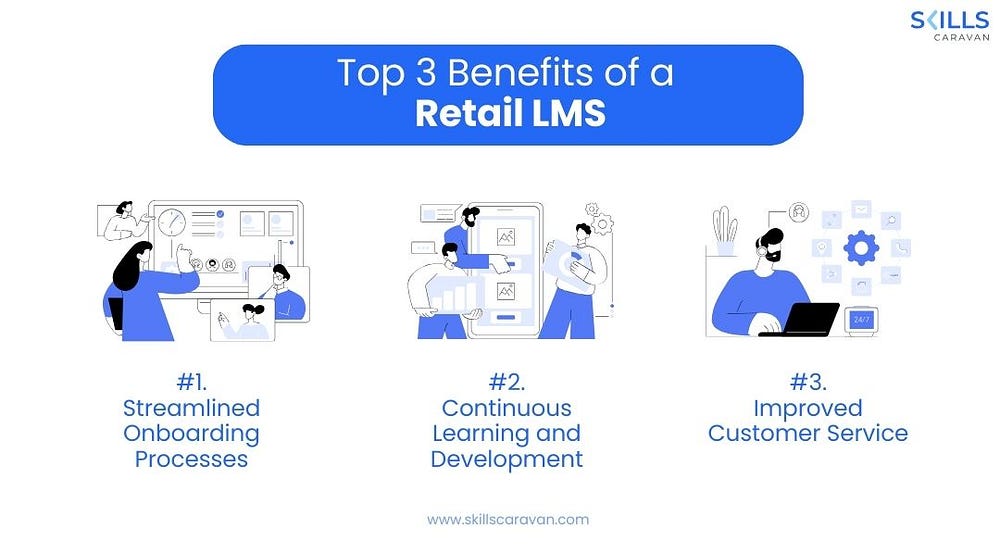Retail LMS: Why Top Retailers Are Investing in Digital Learning Platforms
In today’s fast-paced retail environment, continuous learning is no longer a luxury — it’s a necessity. Top retailers across the globe are recognizing the value of implementing a Retail LMS (Learning Management System) to keep their workforce agile, informed, and motivated. Whether it’s onboarding new hires quickly, training frontline staff on customer service best practices, or rolling out compliance updates across hundreds of locations, a Retail LMS is proving to be a game-changer.

What is a Retail LMS?
A Retail LMS is a specialized learning management system designed to meet the unique training needs of retail businesses. Unlike generic LMS platforms, a Retail LMS offers industry-specific features such as:
- Role-based learning paths for store associates, managers, and corporate staff
- Mobile accessibility for on-the-go learning
- Gamification to engage frontline employees
- Microlearning modules for fast-paced environments
- Performance tracking and reporting by store, region, or role
These systems empower retail organizations to deliver consistent, scalable, and effective training experiences that drive measurable business outcomes.
Why the Retail Industry Needs LMS Solutions
The retail landscape is rapidly evolving due to shifting consumer expectations, rising competition, and workforce turnover. Training must keep pace with these changes. Here are key reasons why retailers are turning to LMS platforms:
1. High Employee Turnover
Retail faces one of the highest turnover rates of any industry. A Retail LMS helps streamline onboarding and reduce ramp-up time, ensuring new hires become productive faster. Standardized onboarding content across stores also ensures consistency in employee experience and brand messaging.
2. Need for Scalable Training
Retailers often operate across multiple locations, regions, or even countries. Manually delivering training to every location is inefficient and costly. A Retail LMS enables centralized training delivery with localized customization, making it ideal for distributed workforces.
3. Rapid Product & Policy Changes
Retail is dynamic — products, promotions, and compliance requirements change frequently. A Retail LMS allows for quick updates and immediate dissemination of new information. This ensures staff remain informed and able to deliver superior customer service.
4. Improved Customer Experience
Trained employees are more confident and capable. They understand the brand, know the products, and can handle customer queries effectively. A Retail LMS enhances employee competence, leading to improved customer satisfaction and loyalty.
5. Compliance and Safety Training
From health regulations to data privacy laws, compliance is critical. A Retail LMS helps ensure all staff complete required training, keeps records of completion, and sends automated reminders for re-certifications, reducing legal risks.
Key Features of an Effective Retail LMS
Not all LMS platforms are created equal. When choosing a Retail LMS, retailers should look for these essential features:
- Mobile-Friendly Interface
Retail workers often don’t sit at desks. A mobile-optimized LMS lets employees learn on-the-go — during breaks, commutes, or between shifts.
- Microlearning Capabilities
Short, focused lessons are more effective in busy retail settings. A Retail LMS should support microlearning modules that staff can complete quickly.
- Gamification and Incentives
Gamified learning with badges, points, and leaderboards makes training engaging. Incentives tied to performance can boost motivation and completion rates.
- Integration with POS and HR Systems
A seamless Retail LMS integrates with existing POS, ERP, or HRIS systems, allowing for automation, real-time performance tracking, and smart learning paths.
- Analytics and Reporting
Actionable insights help managers track progress, identify knowledge gaps, and improve training strategies. Reporting features are essential for compliance audits and ROI measurement.
How Leading Retailers Are Using LMS Platforms
Let’s take a look at how some of the world’s top retailers are leveraging Retail LMS solutions:
- Walmart
Walmart uses a comprehensive digital learning ecosystem to upskill associates, reduce training costs, and promote from within. Their LMS supports video learning, simulations, and mobile access.
- Sephora
Sephora invests in continuous learning to keep staff updated on the latest beauty trends and products. Their Retail LMS helps create personalized learning journeys for store staff.
- Starbucks
Starbucks uses a blended learning approach with its LMS to deliver brand, product, and customer service training across thousands of locations globally.
Benefits of Investing in a Retail LMS
Here are some of the tangible benefits that retailers experience with a well-implemented LMS:
- Reduced Training Costs: Eliminates the need for printed materials, travel, and in-person sessions.
- Improved Sales Performance: Product knowledge and upselling techniques improve through consistent training.
- Employee Retention: Investing in learning shows commitment to employee development, reducing turnover.
- Operational Efficiency: Less time is spent managing training logistics and more time is focused on results.
- Stronger Brand Consistency: Standardized training ensures a unified brand experience across locations.
Choosing the Right Retail LMS for Your Business
When selecting a Retail LMS, it’s important to consider:
- Ease of use for both learners and administrators
- Scalability to grow with your business
- Support for blended learning, including instructor-led training
- Customization for your brand and operational structure
- Feedback mechanisms, like quizzes and surveys
Leading platforms in the Retail LMS space include Docebo, Axonify, Cornerstone OnDemand, and SAP Litmos.
Final Thoughts
Investing in a Retail LMS is no longer optional for retailers who want to stay competitive in a digitally driven marketplace. From frontline sales associates to store managers, empowering your people with the right knowledge at the right time is key to driving performance, improving customer experiences, and increasing profitability.
If your retail organization hasn’t yet adopted a digital learning platform, now is the time. The benefits of a modern Retail LMS extend far beyond training — they create a culture of learning that adapts, evolves, and grows with your business.
Comments
Post a Comment